Getting ready for closing costs doesn't have to be hard. You need to save about 2-6% of what your new home costs. Ask your bank for a list of all the fees you will need to pay. The bank will charge you $500-1,000 for every $100,000 you borrow. You also need to pay for title insurance, which costs $5-10 for every $1,000 of your home price. A lawyer may cost you between $500-1,500. Don't forget to add money for taxes, home insurance, and HOA fees if you have them. You will pay $125-250 to record your home papers with the city. You can ask the seller to help pay up to 6% of these costs. When you know what things cost where you live, you can make a good plan to save money.
Ready to start building equity in your own Michigan home? Get your personalized home loan quote today.
Understanding Standard Closing Costs
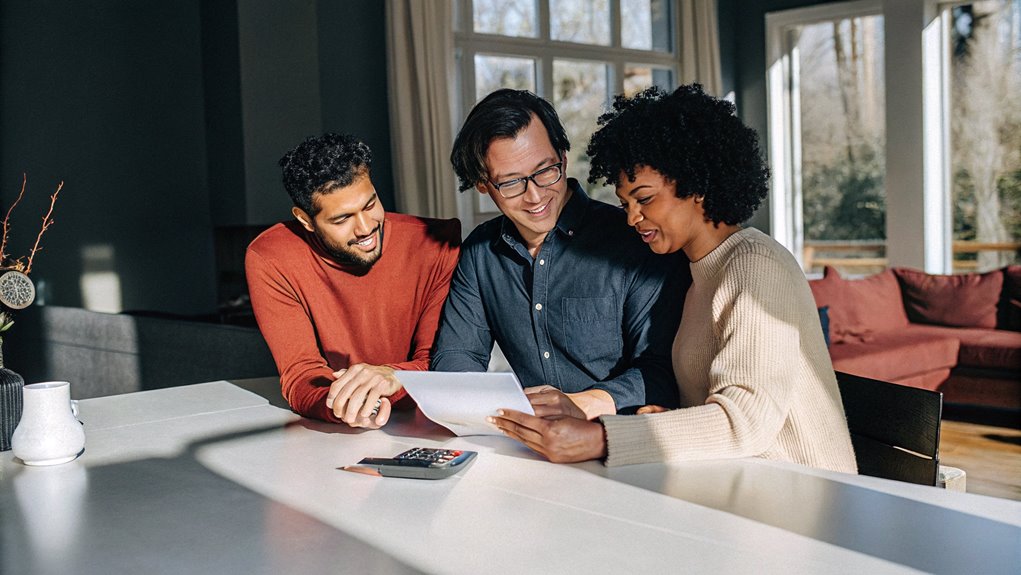
When you buy a home, you need to save extra money for closing costs. These costs are like extra fees you pay to finish buying your home. Most people pay between 2% to 6% of their home's price in closing costs.
You pay fees to the bank for your home loan. The bank will check your credit score and send someone to look at the house. These are costs you can't skip.
You also need to pay for title insurance. This protects you as the new owner. You'll pay someone called an escrow agent to help with all the paperwork.
You must also pay some taxes and home insurance ahead of time. The city needs money to write down that you own the house. They charge fees for this too.
If your new home is part of a community with shared areas, you might need to pay HOA fees early.
Make sure you save enough money for all these costs before you buy your home. This way, you won't have any money problems when it's time to pay.
Michigan residents, unlock the door to your new home. Request your home loan quote from Treeside Financial today.
Calculating Your Expected Fees
Your home costs will have many parts to add up. Let's break them down simply:
Lender fees cost about 1% of what you borrow. Think of it like this – if you borrow $100,000, you pay $1,000 in fees.
You also need to pay for:
- Title insurance to protect your home rights
- Local taxes on your home
- Insurance to keep your home safe
- Someone to check what your home is worth
- A lawyer to help with papers
The best way to know your real costs is to make a list. Write down each cost in one column. Then call local people who do these jobs to get real prices. Write those prices in another column.
Don't forget about taxes when you move the house to your name. These change based on where you live. Ask your agent about these costs in your town.
Lender Fees Explained
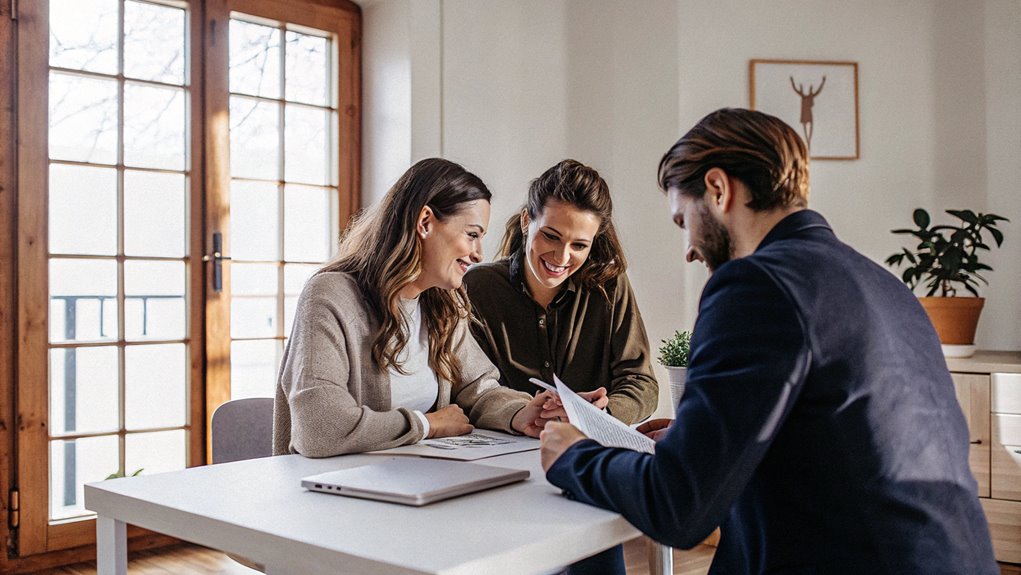
When you get a home loan, you need to pay fees to the bank. These fees are part of what you pay when you buy your home.
The main fee is the loan start-up fee. This is about $500-$1,000 for every $100,000 you borrow. You also pay to fill out forms ($300-$500) and to check your credit ($30-$50).
Banks let you pay extra money up front to get a lower monthly payment. This is called "paying points." One point costs 1% of your loan.
The bank must check all your papers. They charge $300-$900 for this work. They also need to get your loan ready, which costs another $300-$900.
You can ask the bank to lower these fees. The bank must give you a list of all fees within three days after you ask for the loan. This list helps you know exactly what you need to pay.
Title Search and Insurance
Finding out who owns a home and getting insurance for it are two big parts of buying a house.
First, someone looks at all the papers about the home to make sure the seller really owns it. They also check if anyone else says they own it too.
Then, you need to buy title insurance. This keeps you safe if someone later claims the home is theirs. You need two types of insurance – one for you and one for the bank that gives you money to buy the home.
The cost changes based on where you live and how much the home costs.
Understanding Title Costs
When you buy a home, you need to pay for two main title costs.
First, someone needs to check if the home truly belongs to the seller. This check costs about $200 to $400. They look at old records to make sure no one else can claim the home.
You also need title insurance. This is like a safety net that helps if someone later says they own your home. The cost depends on how much you pay for your home. Most people spend about $5 to $10 for every $1,000 their home costs.
There are two kinds of title insurance. One protects the bank that gave you your loan – you must get this one. The other kind protects you as the owner – you can choose to get this one too, but most people do.
Ask your title company how much each will cost before you buy.
Title Insurance Vs Search
When you buy a home, you need to know about two important things: title searches and title insurance. They help keep your home safe in different ways.
A title search is like a detective looking at old papers. Someone checks if the home really belongs to the seller. They also look for any problems, like unpaid bills or taxes.
Title insurance is like a safety net that keeps going. It helps if someone finds old problems that no one saw before. You need two kinds of this insurance. One is for the bank that gave you your home loan. The other is for you, to protect the money you put into your home.
The search finds problems now. The insurance helps if problems pop up later. These problems could be fake papers, unknown family members who claim the house is theirs, or mistakes in old files.
Property Taxes and Insurance
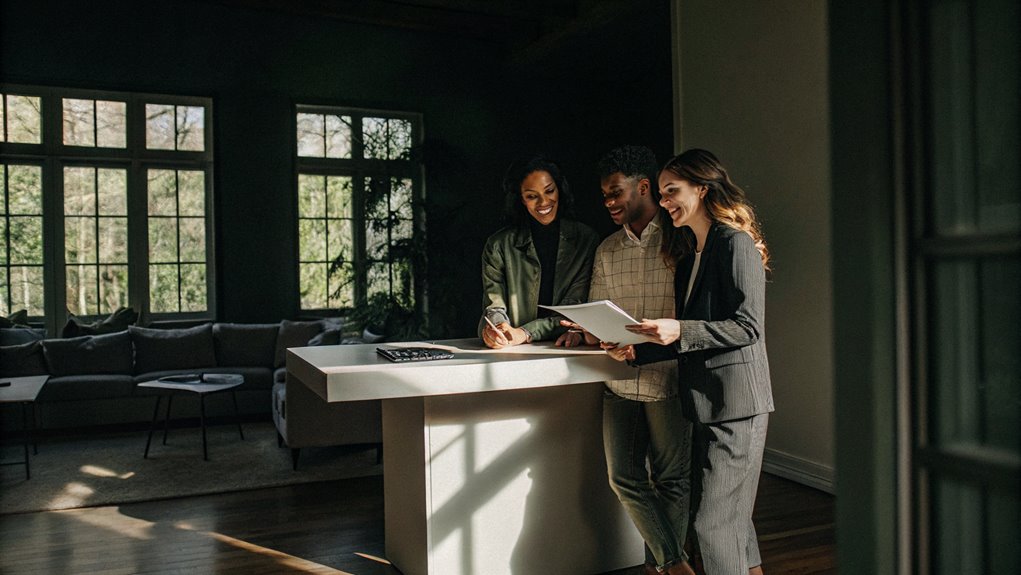
When you buy a house, you need to split the property taxes with the seller based on how long each of you owns the home.
Your bank may want you to set up a special savings account. This account will hold money for your taxes and home insurance.
If you put down less than 20% when buying your home, your bank will make you save for insurance this way to keep their loan safe.
Property Tax Proration Tips
When you buy a home, you and the seller must split the yearly property taxes fairly. Think of it like sharing a pizza – each person pays for their portion.
To get your share right:
- Ask the seller for their latest tax bill
- Check with your local tax office to make sure the bill is right
- Find out how much tax you pay each day (take the yearly tax bill and divide by 365)
- Count the days you'll own the home and times that by your daily tax rate
Watch out for any tax changes that might come up soon. This could mean you pay more or less in the future.
Talk to your agent about these numbers. They can help make sure you pay the right amount. Your closing lawyer should look at the math too.
Insurance Escrow Requirements
When you buy a home with a mortgage, your lender will keep money safe for you in a special account. This account helps pay your property taxes and home insurance on time.
At first, you need to put some money in this account. Most lenders ask for 2-3 months of tax money and about 14 months of insurance money to start. This way, there's always enough money to pay these big bills when they come due.
Each month, part of your house payment goes into this special account. The lender takes this money and saves it to pay your taxes and insurance later. They divide your yearly costs into 12 parts to make it easier.
To know how much money you need, add up what you pay each year for taxes and insurance. Then multiply each by the months your lender wants. That tells you how much to bring when you buy your home.
Home Inspection Requirements
Getting your new home checked is a key step when you want to buy a house. Most home checks cost between $300-$700. The cost depends on how big the house is and where it is. Make sure you have this money saved up.
Your bank might want extra checks done on the house. They may ask for:
- Bug checks
- Air tests
- Building checks
These extra tests can cost $100-$300 each.
Ask for the home check right after the seller says yes to your offer. This gives you time to talk about any problems that come up.
Save a bit more money (about 10-15% more) in case you need more tests done. If the first check finds a problem, you might need experts to look closer at it.
Save up for these costs early. This way, you won't feel stressed about money when it's time to buy your home.
Attorney and Legal Fees

Getting a lawyer for buying a house costs money. You might pay between $500 and $1,500, but prices can be different in each city.
To save money, talk to a few lawyers and ask what they charge. Some lawyers ask for one set price, while others charge by the hour.
To get a better deal, you can ask your real estate agent about lawyers they know. These lawyers might give you a lower price since your agent sent you to them.
Common Attorney Fee Ranges
Lawyers help you buy and sell homes. It costs money to hire them. Most charge $500 to $1,500 for basic help.
City lawyers often cost more than small-town lawyers. This is because living in big cities costs more.
There are three ways lawyers charge you:
- One set price for the whole job ($800 to $1,200)
- By the hour ($150 to $350 for each hour)
- Mixed price (one price for basic help, plus extra costs for more work)
Ask your lawyer how much they charge. Make sure they tell you what you get for your money. Get it in writing before you start.
Fee Negotiation Strategies
When you want to get a good deal on lawyer fees, start by talking to several lawyers. Ask them to show you exactly what each service costs.
Think about what you really need help with, like checking documents and making sure the house title is good.
Talk to the lawyers about ways to save money. Some will give you a better price if you do some of the work yourself. If you have a real estate agent who's done some papers already, tell the lawyer. This can help you pay less.
Some lawyers charge less during slow times or if you close in the middle of the month. You can also tell them what other lawyers charge. Many will try to match the price so you pick them, mainly if it's a simple house sale.
Available Closing Cost Assistance
Getting help with closing costs is easier than you think! Many groups want to help you buy a home.
You can get help from:
The government can help you pay less at closing. They've special home loans that make it cost less to buy a home.
Your state and city also have groups that give money to help pay for closing costs. You don't have to pay this money back.
The person selling the home might help too. You can ask them to pay some of the costs when you buy their home.
Look for these ways to save money early. This will help you find the best deal when you buy your home.
Negotiating Seller Contributions

When you want to buy a home, you can ask the seller to help pay some costs. Think of it as the seller giving you a deal to help close the sale.
The seller can only give a certain amount based on your loan type:
| Loan Type | How Much Sellers Can Help |
|---|---|
| FHA | Up to 6% of home price |
| VA | Up to 4% of home price |
| Regular loan with small down payment | Up to 3% of home price |
| Regular loan with big down payment | Up to 6% of home price |
To get help from the seller, you must ask for it when you make your offer. Your agent knows what sellers in your area might say yes to. Sellers are more likely to help when:
- There are more homes for sale than buyers
- Their home has been for sale a long time
- They really want to sell fast
Mortgage Points and Rates
Buying mortgage points is like paying money upfront to save money later. When you buy points, you pay 1% of your loan to lower your monthly payments. Each point can drop your rate by about 0.25%.
You can save money on your taxes when you buy points. The IRS lets you claim points as a tax break in the same year you pay them.
Think about how long you'll live in your home. If you stay in your home for many years, points can help you save money. But if you plan to move soon, points might cost more than they save.
To know if points will help you save money:
- Add up how much the points cost
- See how much you save each month
- Count how many months it takes to earn back what you spent
If you want to move or get a new loan soon, skip the points and take the higher rate. If you want to stay put for a long time, points can save you money in the long run.
Required Government Documentation Fees
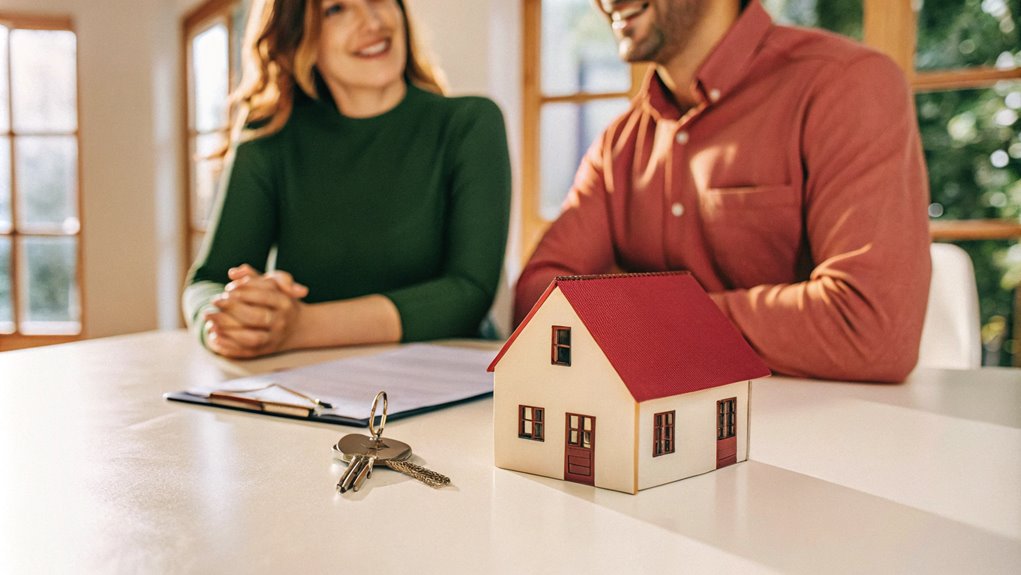
When you buy a home, you need to pay some fees to your local government. Think of these as tickets that make your home purchase official.
First, you pay recording fees. These let the government write down that you own the home. They cost between $125 to $250.
Next are transfer taxes. These are based on how much your home costs. Each area charges a different amount, from a tiny bit to a bigger chunk.
Some places also want you to pay to record your home loan. This is called a mortgage fee.
Last, you need to pay for deed papers. These papers show you own the home. They cost between $100 to $200.
Call your local office to find out what you need to pay in your area.
Local Closing Cost Variations
Buying a home means paying closing costs, and these costs change based on where you live. Some places cost more than others, and the rules can be different too.
Think of your city and state as having their own special rules about home buying costs. Each place sets its own:
- Tax rates on homes
- Fees to record the sale
- Rules about who pays what
When you buy a home, you might pay $2 to $6 for every $100 of your loan. This means if you borrow $100,000, you could pay $2,000 to $6,000 in closing costs.
To know what you'll pay, talk to people who sell homes in your area. They know the local costs and can help you plan ahead. This way, you won't be surprised by the final bill.
Remember to ask what costs are normal in your town. Some places make the buyer pay more, while in other places, the seller pays more.
Saving Strategies for Closing Costs
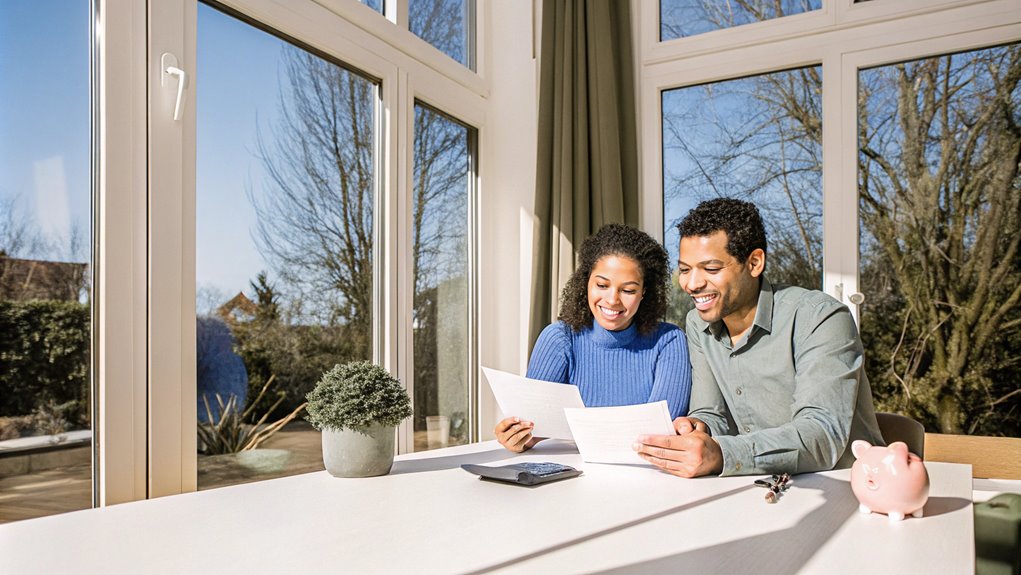
Let's save money for your new home together!
Think about how much your dream house costs. You'll need to save about 3-6% of that price for closing costs.
Pick a date when you want to buy your home. Count how many months you have until then.
Take the money you need and split it into chunks for each month. Put this money in a special bank account that grows your savings.
Cut back on things you don't really need. Skip some movie nights or fancy coffee runs.
When you get extra money from work or tax time, put it in your savings. You could even work a few extra hours to earn more for your goal.
Watch your savings grow each week. If you're not saving enough, try harder to spend less.
This way, you'll have all the money you need when it's time to buy your home.







